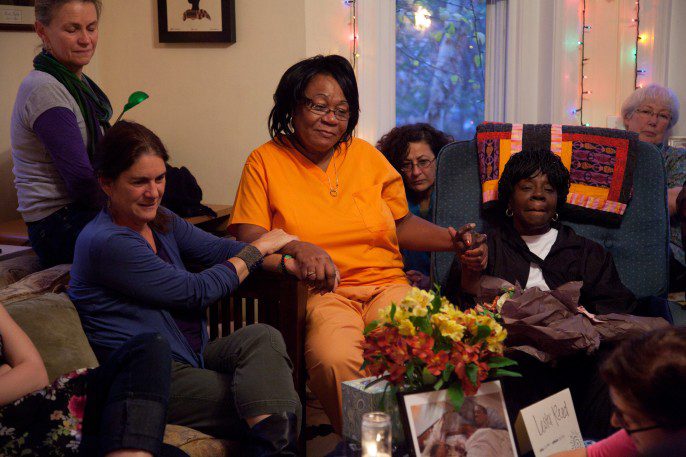Sometimes a person we invite to Joseph’s House for shelter longs for a different home.
Zoe cannot be comforted. For many years she lived on the streets and for years at a time had no contact with her mother. Dying now, of liver disease, she was referred to Joseph’s House a few months ago for hospice care. Since then Zoe and her mother have finally reconnected. In fact, Zoe’s mom comes to see her nearly every day. She personally prepares the food Zoe asks for, strokes her head and holds her when Zoe is anxious, prays with her at bedtime…and cannot take Zoe home, to her old home, to die. Zoe’s mom is also caring for other fragile family members and she can’t bring her daughter home too.
But all Zoe wants is to go home. She wants to sleep in the bed she left as a teenager. She wants to be in familiar surroundings and know that her mother is always within earshot. When she has the strength, Zoe argues and pleads with her mother or cries inconsolably or turns, as she is turned now, to the wall, away from everyone here who cares about her.
This is humbling for us – painful really, because when we invite a desperately ill man or woman to Joseph’s House, we’re inviting them into much more than shelter. We’re welcoming them into our home and our friendship and loving care – into our hearts! But Zoe has little interest in us – she longs for another home and because of this, we feel helpless, a little bit lost. The discomfort of our helplessness can cause us to lean back a bit, distancing ourselves from Zoe, uncomfortable and unsure of how to be with this young woman who is dying and does not want…us. If we had no intentional spiritual practices at Joseph’s House, we might find ourselves avoiding her. Without practices to help us become more aware from moment to moment, the unconscious but painful feelings of our helplessness could so easily cause us to emotionally abandon Zoe without even realizing it. That’s how destructive our pain can be when we don’t recognize it.
But at Joseph’s House we practice turning toward suffering; consciously.
We practice coming along side someone and staying present to them even if we can’t fix the problem. We practice becoming aware of our own thoughts and feelings as we do this and we really pay attention to the person we are with. We think of this as “attuning.” We attune to ourselves and to one another.
Blossom Williams, a nurse’s aide at Joseph’s House, knows that she can’t change Zoe’s reality. There isn’t enough time left and Zoe’s mind seems made up. But when Blossom approaches the room, she pauses at the door and takes a deep breath. This breath gives her a moment to gather herself, soften any tendency to brace against Zoe’s possible rejection, and remember as she crosses into the bedroom that Zoe does not need to like her, want to see her, or even notice her to be worthy of Blossom’s kindness and full attention.
Compassion as solid as this is not inspired just by feelings. It is a way of living. Bringing herself fully to one difficult situation after another; pausing, attuning, remembering her deepest intention, Blossom is learning to live from compassion. Compassion is becoming Blossom’s way of life. As a community of people who serve from the heart at Joseph’s House, we’ve been practicing like this for some time. It’s not easy to put in words, but the difference is real. Sometimes you can almost feel it in the air. Unreserved love. No strings attached.
Our new full-time volunteers have arrived for a year of service-from-the-heart. Caring for the men and women who come to Joseph’s House at the end of their lives, they will learn how racism and social injustice have caused suffering for the people they will come to love very much. This knowledge will pain the volunteers.
But they will also learn that as we open our hearts and turn toward suffering, we begin to dwell in compassion. This is changes everything. Healing becomes possible.
Love, Patty

Share Your Thoughts